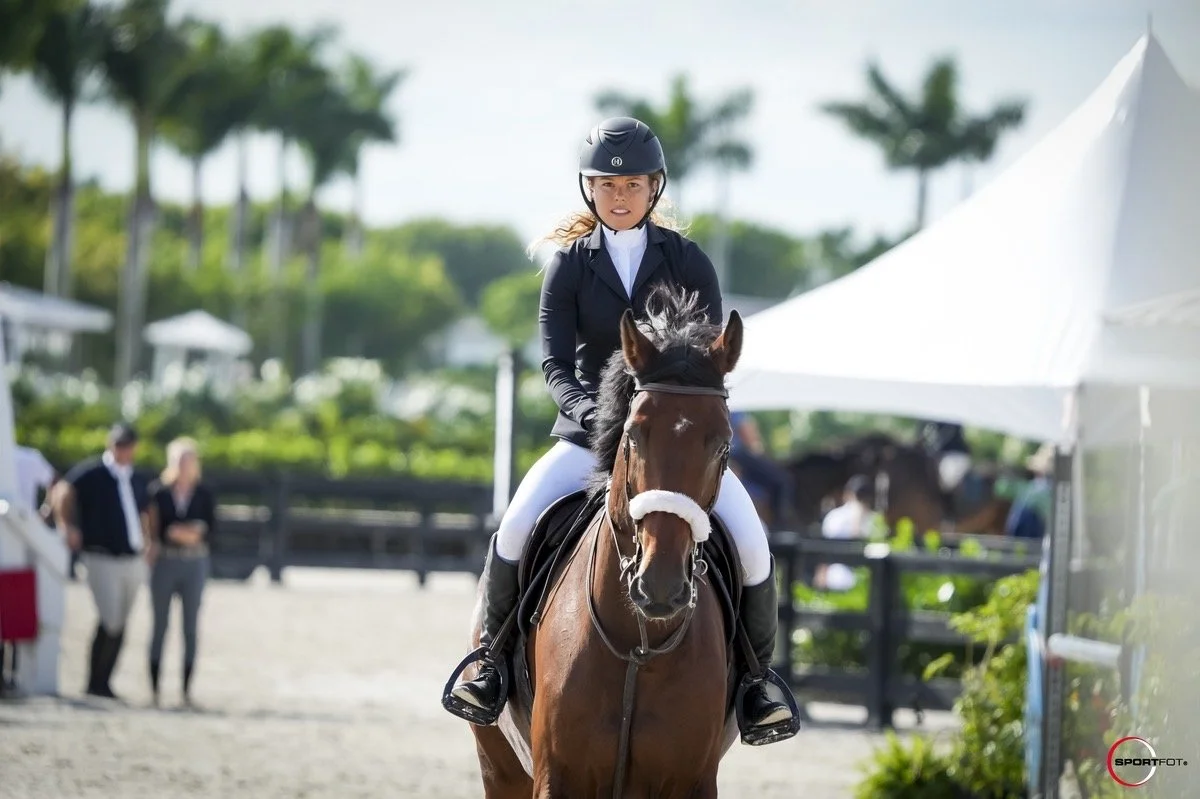The psychological toll from a bad ride.
Growing up playing soccer at a highly competitive level, pressure is not a foreign feeling for me. Being team captain, I’m very familiar with having to lead and hold responsibility for myself and my team. I’ve always been stoic and pretty unmoved by stress and trials, which made me a good competitor. However, it’s different when your teammate is a 1200lb animal that doesn’t speak the same language as you. I don’t mind when my horse has a bad day.. I don’t expect him to be perfect. But when I have a bad day - for example if I repeatedly can’t seem to see my distances to the fence, it haunts me until I’m able to ride the following day and hopefully redeem myself in some capacity. This is not a healthy way to go about this sport. And while I don’t have all the answers, I am willing to be open and transparent about the cons of being a perfectionist and worrying so much about the horse underneath me.
Parlay is extremely honest, he’ll expose any and all of my errors when riding. If I don’t ride him perfectly, he’ll show it. He’s also very forgiving, and will jump his heart out for me on any given day, even if I mess up. However, I can still tell when he’s overly stressed - he grinds on the bit and starts to shut down emotionally. But he’ll never say “no”, he’ll try as many times as I ask. Which breaks my heart all the more when I set him up for failure during a combination in training or during a course. He suffers the consequences when I let him down. There is no worse feeling.
It doesn’t help that I consistently have a better eye to the jumps riding every other horse aside from my own. From ponies to horses of various sizes and stride length, I always surprise myself with how precise I am with them. Which makes it all the more frustrating when I mess up with Parlay. I’ve come up with two reasons for why this happens. One, he’s extraordinarily larger than anything I’ve yet to come close to riding. And two, I add additional pressure to myself because he is mine. My guess is the second takes more responsibility, as I seem to do just fine adjusting for the other horses and even ponies.
It came as a surprise when I began to realize just how limiting the psychological affects can have if unable to control. I find myself more quite the remainder of the day, thinking of the ride during conversations with others, and worst yet, during time spent with my boyfriend Alessi. What makes riding unique to other sports is this : you only have but so many jumps in them. Or sliding stops, or piaffes. Point being, there is a small window of opportunity during your ride in which you get to work on the thing in which you perform. And even then, you can’t be jumping a horse every day, so it’s not even a day to day skill you can practice. Whereas when I played soccer, if I had a bad game I could stay out all night for hours on end training if I needed. When working with your human body, you can push its boundaries far beyond comfort, because you cognitively understand what is happening. We can’t do that to our horses. So if I have a bad ride, I get to sit with it for a while.
A benefit from caring so much is this; I’ve become obsessed with studying on my own time to make me better in the saddle. I don’t have many hours in the day in which I can relax and be on my phone or computer. The time I do have, I make sure I’m learning or writing for the blog. Watching videos of professionals demonstrating gymnastics and grid drills under saddle, listening to podcasts, reading .. anything I can get my hands on. Not only is this making me better for my horse, it’s making me better for every other horse I ride, student I teach, and the employers I work for.
Parlay and I trotting into the 1.10m class at WEF.
And while I’m doing everything I can on my own to conquer the mind games, I’ve decided to take it a step further and hire a sports psychologist who specifically works with equestrians. My first consultation via phone call is scheduled in a week from today, so check back here in the coming weeks for a follow up blog on the subject.
In all my years playing travel soccer, and some collegiate, I never felt the need for any help of this nature. I say this in hopes that it sheds some light on the gravity of emotions riders can feel for their horses and their sport. It’s not just another animal you feed, care for, and ride. It’s not a pet, either. It’s an athlete bred to do a job, who’s been trained its entire life to do so. If we do right by them, they show up every day for us. That in and of itself deserves a rider who is prepared, educated, and passionate. If we can’t give them that, then we have no right to be frustrated when they don’t give that back in return.
I don’t expect it to be a beautiful, effortless, perfect path forward. If it were that, I’d get bored quickly. The challenges and trials are what make it all that much more satisfying, as they make us into better people for everybody involved, our horses included. That’s what it all circles back to; we do this for the horse.
